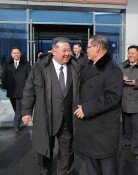Overpayment in Labor Costs of Presidential Committees Exposed
Overpayment in Labor Costs of Presidential Committees Exposed
Posted May. 09, 2005 23:22,
It has turned out that the functions of some presidential committees overlap, and in some cases, there was a wrong judgment on the research service contract which caused an overpayment in labor costs.
The Board of Audit and Inspection (BAI) announced the results of the inspection on the actual condition of the then presidential advisory committees and its establishment, management, and budget execution on Monday, May 9, and reported the above to the National Assembly, which had requested the investigation.
According to investigation results, the Presidential Committee on Government Innovation and Decentralization and the Presidential Commission on Devolution Promotion for Local Authorities have overlapping work in some areas.
The Presidential Committee on Education Innovation contracted seven academic research services from November 2003 to July 2004, and paid 12 million won to six related government officials who were not subjected to the payment for service expenses, but had belatedly recollected it.
The Presidential Commission on Policy Planning contracted nine academic research services from July 2003 to September 2004, but permitted them at least eight to 14 days after the deadline, and overpaid 19.61 million won in labor expenses.
Based on the results, BAI advised to the applying departments and heads of the committees to settle the overlapping functions and set up improvement plans for flexible management and uprooting overpayment in research service expenses.
Problems also showed in the process of appointing responsible management organizations and in its management. Seven organizations including National Veterinary Research and Quarantine Service, National Plant Quarantine Service, Suwon Maintenance and Construction Office for National Roads and Aviation Meteorological Office were appointed responsible management organizations even though they did not meet the independent and autonomic conditions.
It was confirmed that some central administrative institutions intervened in personnel management, not ensuring the autonomy in personnel rights of its affiliating organizations, and making direct decisions for promotion.
taewon_ha@donga.com



![[단독]임성근, 4차례 음주운전 적발…99년 집행유예 기간 중 무면허 음주 적발](https://dimg.donga.com/c/138/175/90/1/wps/NEWS/IMAGE/2026/01/20/133195400.1.png)



